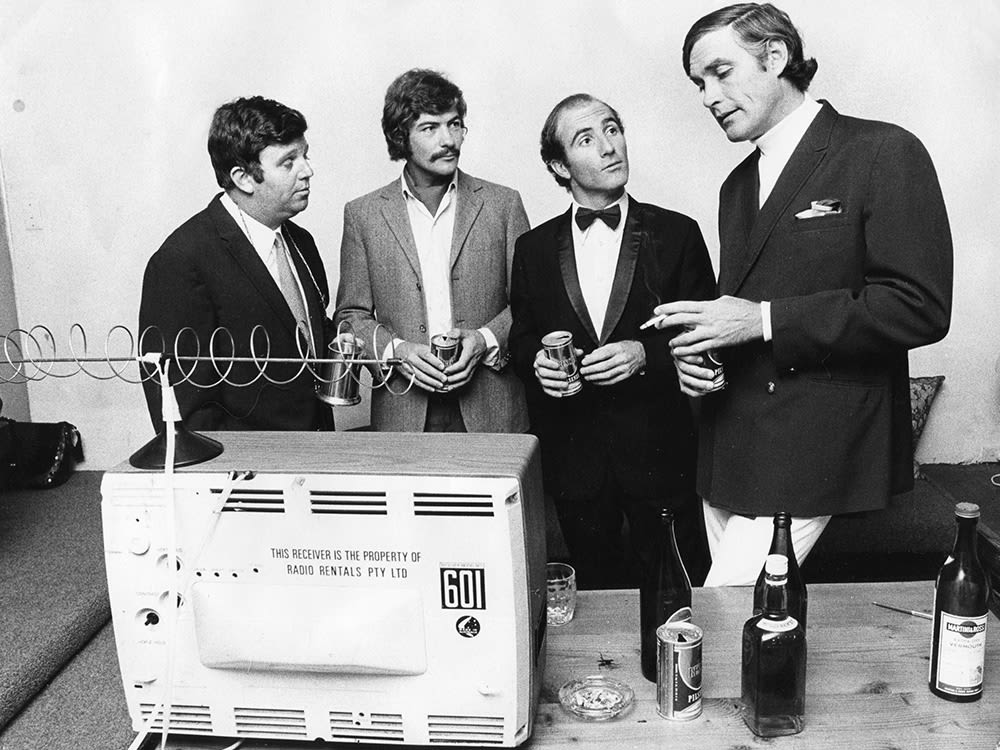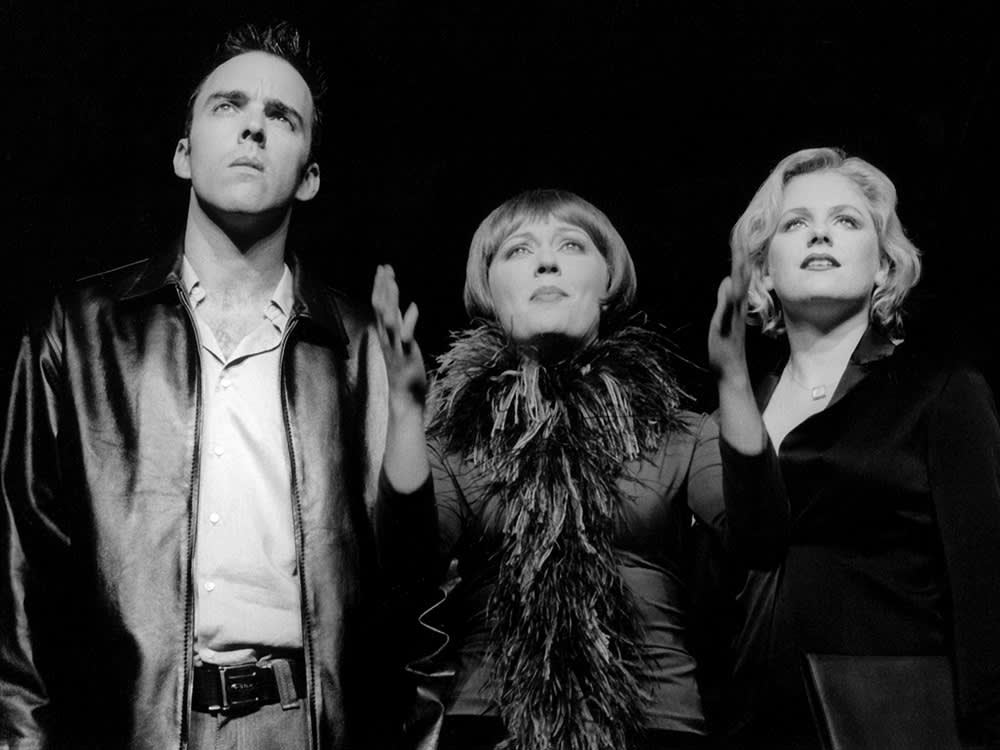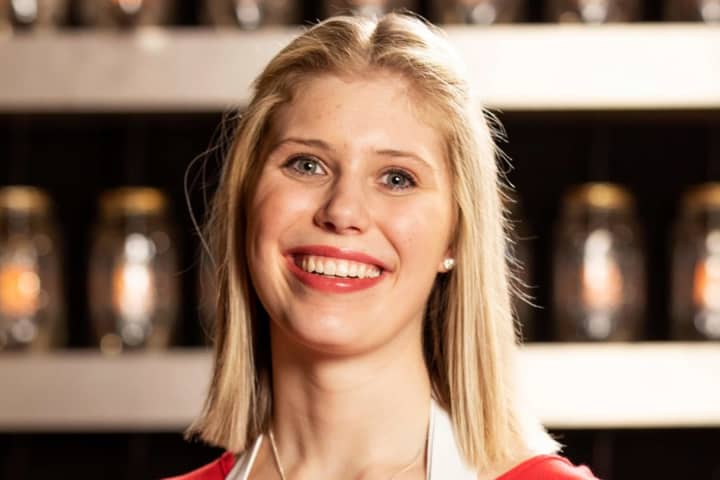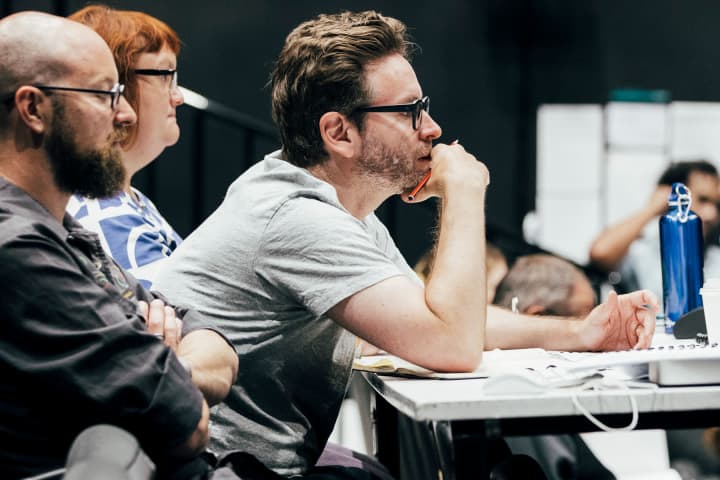David Williamson is Australia’s most prolific playwright. He is the most produced and most recognised dramatist the country has ever seen. At Melbourne Theatre Company alone, he has had over 20 plays staged in his 50-year career.
Tall-poppy syndrome feels eerily applicable in the case of David Williamson. At 6'7", the 77-year-old towers over most people he meets. His devotees love him, but equally a groundswell of disdain for Williamson has flourished in Melbourne and Sydney’s indie theatre scenes for nearly as long as his shows have filled the city’s biggest theatres. He is, for lack of a better expression, a very tall poppy.
Early in his career, Williamson was known for interrogating the establishment, but his success now means he represents the establishment. His ascension to ‘sell-out’ was almost immediate, he remembers. As soon as Don’s Party hit Russell Street Theatre in 1973, his peers from the Pram Factory and La Mama were claiming he’d betrayed the very purpose of a dramatist’s profession. ‘I had to flee to Hurstbridge and then to Sydney to get away from the feeling I was a bourgeois sell-out.’

Don’s Party 1973 – James H. Bowles, Gregory Ross, Martin Harris, Allan Lander. Photographer unknown
Williamson grew up far from this ideological scuffle in Bentleigh, a peaceful part of Melbourne 13km southeast of the CBD. His father was a bank teller and his mother worked as a sales clerk at Myer. ‘I didn’t even have an under-privileged background to fall back on,’ he says, half in jest. Melbourne’s theatre landscape at the end of the Menzies era was one of ferocious identity politics, he explains. ‘That was the thing about theatre, you had to come from a disadvantaged background and have suffered. I was failing on all counts: I had a comfortable childhood, I was Anglo-Celtic, I wasn’t even Catholic. At least if you were Catholic that gave you some kudos … I was missing out on all the qualifications required except for the audience; they were always on my side.’
Williamson is quick to acknowledge his good fortune in sustaining such a long career in an industry that doesn’t always support longevity. He feels especially fortunate given he studied mechanical engineering – a course he vehemently loathed. ‘I only did it because all boys who were mathematically minded were shunted into science-oriented HSC streams,’ he says. ‘And mechanical engineering had the least chemistry in it, and I despised chemistry more than just about anything.’ He limped through his first two years at the University of Melbourne and just passed. He didn’t bother to sit his third year exams. His professor threw him a life raft, saying he could transfer to Monash University provided he studied, and passed.
‘I hated it all. I hated the big greasy engines. I was never cut out to be an engineer. The only thing that kept me amused was writing for the Engineering Revue.’ Williamson recalls his parents being in constant marital warfare at the time; to escape, his father would go to his shed and spend hours tinkering with electronics. ‘So I associated electronic instruments with marital discord, and I felt a revulsion to them as much as chemistry.’ He ended up graduating from Monash University with Honours, before heading back to the Parkville campus of the University of Melbourne to study a Masters degree in Social Psychology. What his years at both universities did do, however, was introduce a young David Williamson to theatre.
‘I remember the plays that really got to me were Harold Pinter’s The Caretaker and Edward Albee’s Who’s Afraid of Virginia Woolf. They both just blew my mind …’
‘I remember the plays that really got to me were Harold Pinter’s The Caretaker and Edward Albee’s Who’s Afraid of Virginia Woolf. They both just blew my mind – I’d never seen drama like it. Albee was the first dramatist who was daring enough to bring the sub-conscious into conscious dialogue. And it was riveting. As was Pinter with the undertone of menace and the black side of human nature. Those early productions for us students were mesmerising.’ By the time Williamson was ready to commence a postgraduate degree in psychology, his own playwriting took off.
Don’s Party – a seemingly lightweight story about a group of middle-class friends who get increasingly intoxicated over the course of the 1969 federal election night – opened in Carlton in 1971 to his parents’ utter dismay. Fielding snide remarks from their peers at the Frankston Bowls Club (where his mother was president), both Mr and Mrs Williamson expressed horror at their son’s occupational pivot. Writing plays with four-letter words was not on the agenda, his mother reminded him, while his father couldn’t understand the financial precariousness of his son's decision-making. So Williamson started lecturing engineering at Swinburne University to subsidise his life as a writer. But in spite of his parents’ disapproval, he’d caught the bug and nothing could compel him to stop. Over the next five decades, he would write 57 plays, 12 screenplays and five mini-series. ‘I think they grew prouder of me as time went on,’ he reflects. ‘But in 1970, it was total horror.’

The Removalists 1974 – Martin Phelan, Michael Edgar. Photo: Rob Lawler
By 1972, Williamson was considered a champion of the Left. His play The Removalists dissected Australian society at a time of momentous social upheaval, and examined the previously out-of-bounds topics of domestic violence and police brutality. It won Williamson the Australian Writers’ Guild AWGIE Award for Best Stage Play and Best Script in any medium. He also collected the coveted George Devine Award for the play's London production – the first time it had been awarded to a non-British writer. A year later, MTC presented Don’s Party at Russell Street Theatre and cemented his reputation as the new voice of Australia. But for some critics, and the industry that had championed his earliest works, he became the ‘sell-out’.
‘The worst thing a play could do was attract a middle-class audience,’ he says. ‘And middle-class people were seen to be going to my plays which was really, really bad around Carlton. It was painful. I still regarded middle-class people as human beings who had lives that were interesting. But that was very much during the Australian left-wing era. And to make money from your writing was even worse!’ As Williamson’s plays were picked up again and again by MTC founder John Sumner, his peers at La Mama and the Pram Factory ostracised him for pandering to the middle classes. ‘As far as I was concerned, I was writing social commentaries about the deficiencies and foibles and affectations of the middle class.’
It’s a reputation that has followed him from Melbourne to Sydney and even up to sunny Noosa where he currently resides with his writer wife, Kristin. Together they helped found the Noosa Alive! Arts Festival, where a Williamson play is the cornerstone of every year’s program. As he’s gotten older, his style has shifted slightly. ‘There’s always been a humorous element or a satirical element amongst the blackness,’ he says. ‘It’s important to have the relief of laughter. As I’ve gotten older, perhaps I’ve become a little more tolerant and the emphasis has shifted more towards satire, rather than brutal satire,’ he considers.
MTC’s Literary Director Chris Mead says Williamson’s form rarely deviates from a utilitarian template: everyday Australians battling it out over a prickly social or political issue, growing increasingly rapacious throughout the course of the play. Humanity’s avarice and narcissism continues to motivate the playwright, says Mead. ‘He remains shocked and appalled by the bourgeoisie’s capacity for generosity and cruelty, grand gestures and petty nastiness, nobility and fallibility, and he genuinely believes that with theatre, we can air and exorcise our demons, that it is a place where unreasonable people can inspire reasonable discussions.’

Up for Grabs 2001 – Felix Williamson, Kirstie Hutton, Helen Dallimore. Photo: Tracey Schramm
Williamson has seen many twists and turns in his five decades as a writer – the strangest of which was probably the West End premiere of his play Up For Grabs, starring America’s Queen of Pop, Madonna. ‘It was totally bizarre,’ he remembers. ‘It was my only sold-out West End experience; people were scalping tickets for 500 quid. I can’t claim that was because of me, they all came to see Madonna.’ As the story goes, Madonna refused to go on stage unless Williamson made significant changes to the play’s climactic ending. ‘She said there had to be retribution [for her character]. “She has to suffer for her sins” sort of thing. It’s the American puritan beginnings,’ Williamson thinks. ‘There’s an earnestness to America that we often don’t realise.’ It’s unlikely that Catholic-raised Kabbalah-obsessed Madonna would admit to bearing puritan beliefs, but it was an experience Williamson learnt from nonetheless. ‘At least I had a sold-out West End experience … I didn’t see that one coming over the horizon.’
‘There’s a huge amount of young talent today, and what excites me most is that there’s a need for Australian audiences to see their own lives. It’s almost an expectation.’
He has been fortunate to see his plays travel across the Americas, Asia and Europe, although he prefers to see them performed at home. ‘I write plays out of my Australian experience; the dialogue, the attitudes, and the social situations are very Australian.’ When Williamson started out, there were few Australian voices on stage. Artistic directors, or ‘gate keepers’ as he calls them, went to London and New York to pick the biggest hits and bring them back to our stages. ‘There’s a huge amount of young talent today, and what excites me most is that there’s a need for Australian audiences to see their own lives. It’s almost an expectation.’ These Australian stories are responsible for leaving a dramatic legacy, he explains, about what it was like to live in this country at certain periods in history. ‘It’s something we take for granted now, which we shouldn’t.’
Of his many Australian stories, Emerald City remains a personal favourite. The satirical comedy takes swipes at life in the entertainment industry, which is something he knows all too well. When MTC and Queensland Theatre revive the work in March, Williamson will be sitting in the Sumner proudly.

David Williamson at the opening of Emerald City in 1987. Photo supplied by Williamson
Writing on average two plays a year doesn’t happen accidentally. It requires an enormous amount of discipline and passion, which Williamson has harnessed to surpass any other Australian playwright working today. ‘I’m a compulsive writer,’ he says. ‘I love putting something together on paper that will have a life on stage. Some people are addicted to crossword puzzles or Sudoku. I love starting with nothing and building something that has enough momentum to create a story that can keep an audience engaged. I actually like the act of writing.’ Could this penchant for problem solving be the influence of his mathematical brain? ‘I don’t write a set of equations,’ he says, ‘but what is vital to drama is a tight overall structure … which is the sort of mind that is probably shared with mathematicians, yes.’
After 50 years of high-volume, high-return playwriting, Williamson is going out with a bang, with four productions on the 2020 calendar around the country. Of all the productions that have come and gone, it’s clear there’s none he is prouder of than his family. As a father of five and grandfather of 14, Williamson now has three sons working in the industry, and a 22-year-old granddaughter studying acting. ‘The identity politics [at universities today] are ferocious, you know, “dead white males should get out of the way,” [my granddaughter says] … we’ve come full circle,’ he laughs. As the sound of young, squabbling voices rises in the background, the playwright explains he is currently on ‘grandfather duties.’ And with that, he heads off into the next act of his life.
Emerald City is on at Southbank Theatre, The Sumner, from 6 March — 18 April 2020
Published on 6 February 2020





